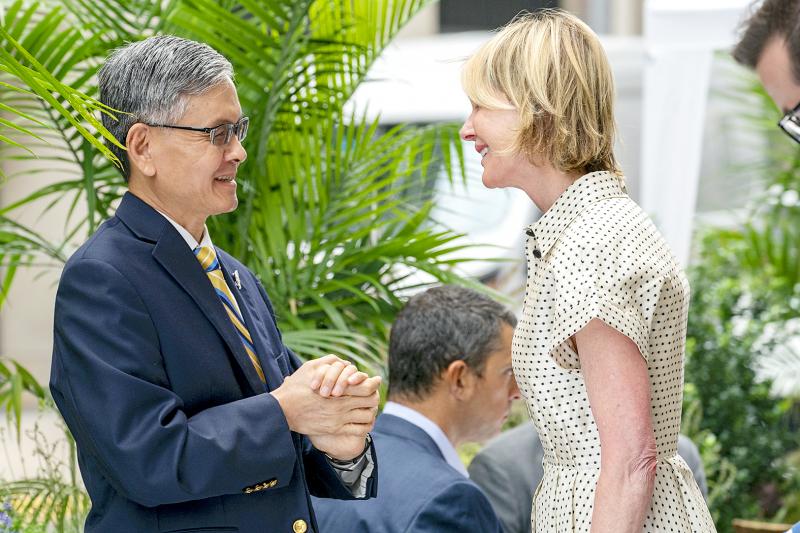US Ambassador to the UN Kelly Craft on Wednesday had lunch with Taipei Economic and Cultural Office in New York Director James Lee (李光章), a meeting she called “historic” and a further step in the US’ campaign to strengthen relations with Taiwan.
Craft said her lunch with Lee at an outdoor restaurant on Manhattan’s East Side was the first meeting between a top Taiwanese official and a US ambassador to the UN.
“I’m looking to do the right thing by my president, and I feel that he has sought to strengthen and deepen this bilateral relationship with Taiwan, and I want to continue that on behalf of the administration” of US President Donald Trump, Craft said.

Photo: AP
The meeting came weeks ahead of the US presidential election on Nov. 3 and barely a day before US Undersecretary of State for Economic Growth, Energy and the Environment Keith Krach arrived in Taiwan.
Warmer US relations with Taiwan are largely a result of strong bipartisan support in the US Congress, but also appear to show how the Trump administration is willing to defy Beijing’s threats and promote an alternative to Chinese Communist Party authoritarianism.
Craft said that Lee, who was secretary-general in the Ministry of Foreign Affairs until July and had recently arrived in New York, invited her to lunch and she accepted.

Photo courtesy of the Taipei Economic and Cultural Office in New York via CNA
“It was a nice way for the host country to welcome him to New York, and to hear about his family and his experience, and obviously his respect and admiration for the Chinese people,” as well as the “many, many innovations in technology ... that Taiwan has to offer the world,” Craft said.
Craft said that Taiwanese “need to be heard and they’re being marginalized by Beijing.”
“It really is a shame because they should be able to participate in UN affairs just like everyone else,” she said. “If the US doesn’t stand up to China then who’s going to when it comes to Taiwan, and not only Taiwan, but Hong Kong and others?”
Craft said that she and Lee “discussed different ways that we can best help Taiwan become more engaged within the UN.”
She echoed Trump in pointing to an e-mail sent by Taiwan to the WHO in December last year that the organization ignored, warning about person-to-person transmission of COVID-19 in China, which indicated that the infection was highly contagious.
“Obviously, we really are pushing for them to be back into the UN, or have a role in the UN health assembly,” Craft said.
Lee called Craft “a terrific diplomat” and said that he was at the meeting to engage, and being new in town, he appreciates meeting people and making friends.
“Taiwan and the US share the values of democracy, human rights and the rule of law,” Lee said. “We could make great partners.”
Craft said that the next step is “just being supportive ... and just making sure that he knows that the US appreciates all of their contributions.”
“They have so much to offer the world and are most unselfish about sharing best practices,” she said. “They care about the relationship [of] the Chinese people with the Taiwanese. They care — which to me spoke volumes.”
Craft said that the US and Taiwan share the goal of promoting democracy, and that she was looking forward to meeting President Tsai Ing-wen (蔡英文) one day.

SECURITY: As China is ‘reshaping’ Hong Kong’s population, Taiwan must raise the eligibility threshold for applications from Hong Kongers, Chiu Chui-cheng said When Hong Kong and Macau citizens apply for residency in Taiwan, it would be under a new category that includes a “national security observation period,” Mainland Affairs Council (MAC) Minister Chiu Chui-cheng (邱垂正) said yesterday. President William Lai (賴清德) on March 13 announced 17 strategies to counter China’s aggression toward Taiwan, including incorporating national security considerations into the review process for residency applications from Hong Kong and Macau citizens. The situation in Hong Kong is constantly changing, Chiu said to media yesterday on the sidelines of the Taipei Technology Run hosted by the Taipei Neihu Technology Park Development Association. With

A US Marine Corps regiment equipped with Naval Strike Missiles (NSM) is set to participate in the upcoming Balikatan 25 exercise in the Luzon Strait, marking the system’s first-ever deployment in the Philippines. US and Philippine officials have separately confirmed that the Navy Marine Expeditionary Ship Interdiction System (NMESIS) — the mobile launch platform for the Naval Strike Missile — would take part in the joint exercise. The missiles are being deployed to “a strategic first island chain chokepoint” in the waters between Taiwan proper and the Philippines, US-based Naval News reported. “The Luzon Strait and Bashi Channel represent a critical access

‘FORM OF PROTEST’: The German Institute Taipei said it was ‘shocked’ to see Nazi symbolism used in connection with political aims as it condemned the incident Sung Chien-liang (宋建樑), who led efforts to recall Democratic Progressive Party (DPP) Legislator Lee Kun-cheng (李坤城), was released on bail of NT$80,000 yesterday amid an outcry over a Nazi armband he wore to questioning the night before. Sung arrived at the New Taipei City District Prosecutors’ Office for questioning in a recall petition forgery case on Tuesday night wearing a red armband bearing a swastika, carrying a copy of Adolf Hitler’s Mein Kampf and giving a Nazi salute. Sung left the building at 1:15am without the armband and apparently covering the book with a coat. This is a serious international scandal and Chinese

COUNTERINTELLIGENCE TRAINING: The ministry said 87.5 percent of the apprehended Chinese agents were reported by service members they tried to lure into becoming spies Taiwanese organized crime, illegal money lenders, temples and civic groups are complicit in Beijing’s infiltration of the armed forces, the Ministry of National Defense (MND) said in a report yesterday. Retired service members who had been turned to Beijing’s cause mainly relied on those channels to infiltrate the Taiwanese military, according to the report to be submitted to lawmakers ahead of tomorrow’s hearing on Chinese espionage in the military. Chinese intelligence typically used blackmail, Internet-based communications, bribery or debts to loan sharks to leverage active service personnel to do its bidding, it said. China’s main goals are to collect intelligence, and develop a